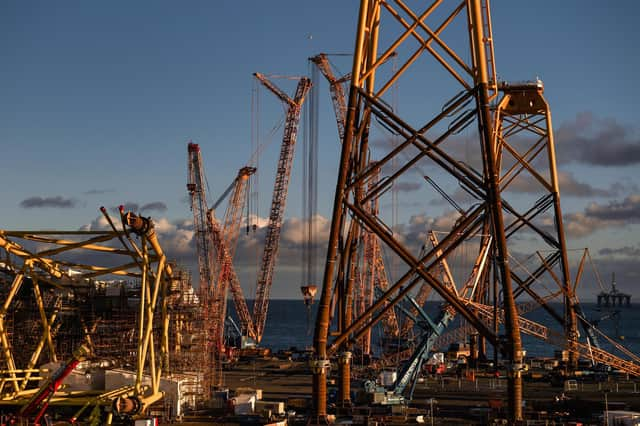Renewable energy is creating a jobs boom in North of England, so why not Scotland? – Kenny MacAskill MP


With Scotland possessing 25 per cent of Europe’s offshore wind resource, you’d therefore think we’d be firing on all cylinders. For sure, there’s much happening with different fields opening and work progressing. But for Scotland, rhetoric isn’t matching reality.
As I sat down to write this, an email came in notifying me of progress with an application for another field off Scotland’s east coast. The Berwick Bank development has the capacity to power five million homes. The name seems a misnomer, as it’s located more off the coasts of Fife and Angus, but the energy will come ashore just past Torness in East Lothian.
Advertisement
Hide AdAdvertisement
Hide AdOther fields are also going to land in the county, with other developments coming ashore at Cockenzie. Both those sites provide easy access to the National Grid from their current and historic roles in powering the nation. But where’s the benefit for local communities and, more importantly, the construction jobs for the turbines?
There’s a current gap in legislation for offshore wind. Community benefit applies to onshore turbines but none exists for offshore, as no doubt it was never anticipated. But it should. Shetland was transformed by a modest benefit from the landing of oil and gas. Why shouldn’t communities benefit from the landing of wind energy?
Moreover, it shouldn’t be left to developers to pick their chosen projects and project their corporate image. It should be available to the local authority to improve their community as Shetland did. That’s a matter I’m taking up with the UK minister.
But what about onshore jobs in offshore turbine construction? As with oil and gas a generation ago, yard order books should be full and there should be work aplenty. But whilst that’s happening in North East England, it’s not being replicated in Scotland.
In Hull, 1,000 people are working at the Siemens Plant and more are to be recruited. They’ve been building for fields including some off the Yorkshire coast. The GE plant in Teesside’s due to open shortly, employing 750 and working on fields including the Dogger Bank development that gave wind to the Prime Minister’s hyperbole.
So the North of England is getting the benefit of the wind off its shores but where’s ours here in Scotland? BiFab lies idle in Fife, as does Arnish in the Western Isles. As well as community benefit from offshore energy, there should be jobs for the community. But north of the Border, there’s not much so far.
Neither of those yards could have supplied all the fields off our shores but they certainly can supply some. The UK government’s ensuring that benefits come onshore in England as they seek to shore up Red Wall seats.
But what’s the Scottish government done? Governments don’t get everything they want but they can always get something. They’ve influence, and can invariably get something, even if not everything they’d wish.
Advertisement
Hide AdAdvertisement
Hide AdThe failure to deliver turbine jobs to Scottish yards is truly staggering.
Kenny MacAskill is Alba Party MP for East Lothian
A message from the Editor:
Thank you for reading this article. We're more reliant on your support than ever as the shift in consumer habits brought about by coronavirus impacts our advertisers.
If you haven't already, please consider supporting our trusted, fact-checked journalism by taking out a digital subscription.
Comments
Want to join the conversation? Please or to comment on this article.
